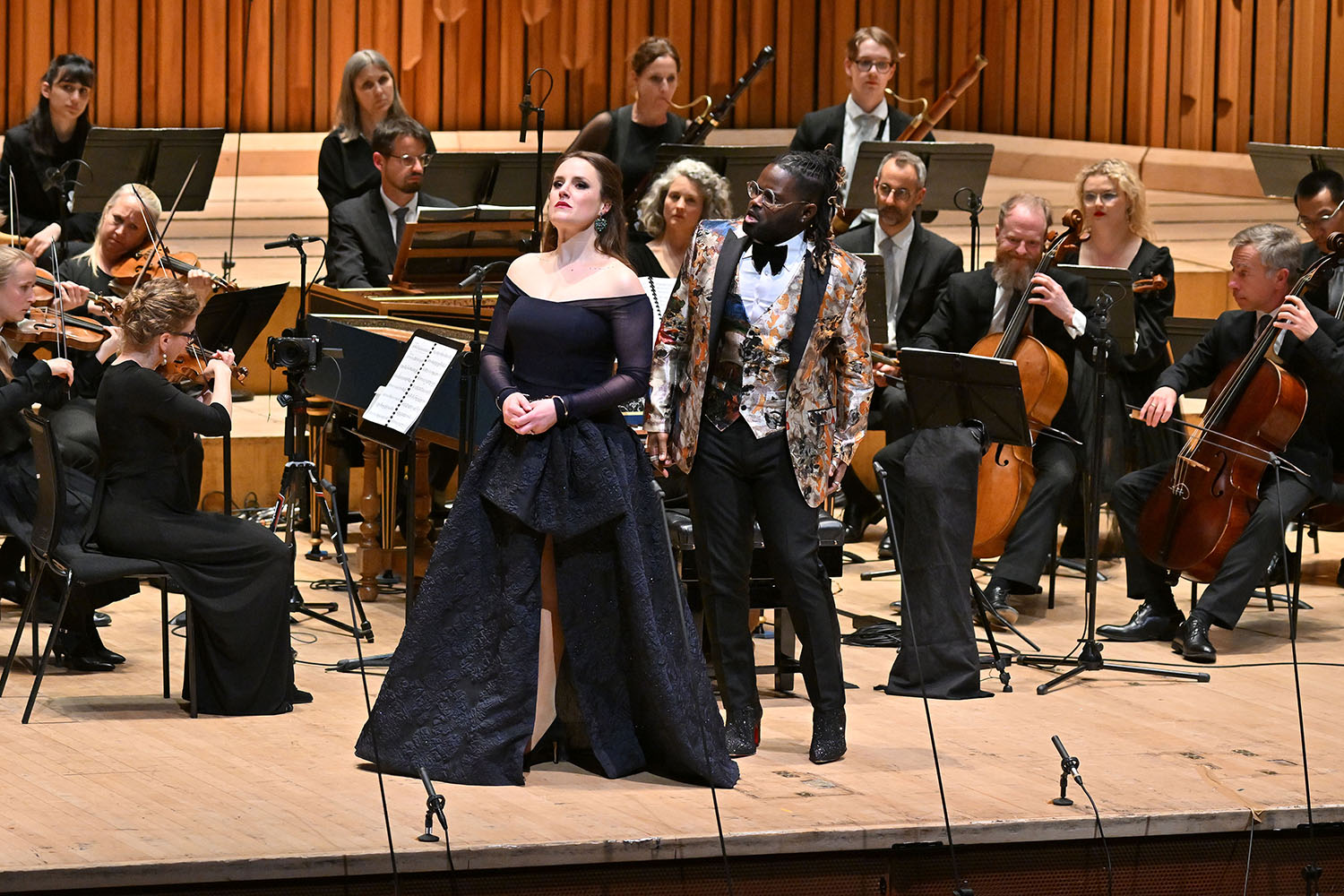Giulio Cesare
Barbican, London EC2
Bach 1725
Sheldonian theatre, Oxford
Stile Antico 20th Anniversary Gala Concert
Wigmore Hall, London W1
Handel could have made merry with today’s leaders, no names mentioned. He understood the fickleness of power, the coiling spirals of ambition and self-love. His opera Giulio Cesare in Egitto, first performed at the King’s theatre, London in 1724, casts the Roman dictator as a young military hero, at first pugnacious and vain; then threatened by circumstance, absorbed by his own vulnerability. Worlds away from Shakespeare, this mostly fictitious Caesar ends up marrying Cleopatra and all rejoice. The English Concert, directed from the harpsichord by Harry Bicket in a semi-staging at the Barbican, conveyed every gradation of humanity, musical and emotional, etched into this lustrous score.
This was the group’s fourth performance of Giulio Cesare, after three in the US, with a sterling cast of eight led by the French countertenor Christophe Dumaux as Caesar and British soprano Louise Alder as Cleopatra. The performance will be available to watch next year, as part of the group’s free Handel for All series. The performers’ easy confidence with their roles, no scores needed, allowed them to exploit the Barbican space, whether rushing on with a severed head in a carrier bag (head, Pompey; bag, Waitrose) or spying from behind the violins, or lying prone at the front of stage. Dumaux, mesmerising in his capacity to turn simple phrases into jewelled cascades of ornament, had the right air of virile brio. Cleopatra, for all her kittenish wiles, could never resist him. A hit in this role at Glyndebourne last year, Alder moved convincingly from power-crazy ditz to serious woman in love, her vocal agility never less than impressive. (She will sing the Countess in Mozart’s Marriage of Figaro at Glyndebourne this summer, and at the BBC Proms on 27 August. She is also a star of the Last Night on 13 September.)
As the scheming Tolomeo, the American countertenor John Holiday – just back from singing the title role in Philip Glass’s Akhnaten in Berlin – gave us a masterclass in lustful strutting. Wearing glittery designer heels, tight trousers and gold brocade jacket, he threw himself into an over-the-top characterisation. A third countertenor, the Chinese rising star Meili Li (Nireno), had less to do but still made a mark. Some of the most remarkable singing, as so often in this opera, came from the widowed Cornelia (Scottish mezzo-soprano Beth Taylor) and her stepson Sesto (Irish mezzo-soprano Paula Murrihy), mourning the death of Pompey. In their grief-laden Act 1 duet, their voices veered from dissonance to resolve in near guttural, daring howls.
The English Concert players were lithe and buoyant throughout. The German Handel, who three years after Cesare would become a naturalised British citizen, was lucky with his opera-loving aristocratic sponsors, who called themselves the Royal Academy of Music. Their largesse meant he could have the orchestral forces he fancied, including two theorbos, harp and, here led by Ursula Paladan Monberg, four horns. Instrument held high, standing to play, she turned her big moment in Caesar’s Va tacito into memorable drama.
I defy you to look at Bach’s handwriting, his flurrying note heads, ink almost piercing the paper, and not be moved
I defy you to look at Bach’s handwriting, his flurrying note heads, ink almost piercing the paper, and not be moved
Monberg also had a prominent role in Bach 1725 at the Sheldonian theatre, Oxford, with the Orchestra of the Age of Enlightenment, in JS Bach’s festive Ascension day cantata Auf Christi Himmelfahrt allein, BWV 128. This performance, conducted by John Butt and sung by the choir of New College, marked the recent acquisition, by the Bodleian Library, of the work’s autograph manuscript. This rarity, unusually well preserved, is one of only four Bach autographs in the UK (Cambridge has one, the British Library two). As part of the celebration, two premieres by young composers Nick Samuel (b.2004) and Daniel Reynolds (b.2005) skilfully explored how baroque forces could speak to modern sonorities. The other new work was Upward by Judith Weir, former Master of the Queen’s Music, commissioned to act as a prelude to the cantata. Using two high horns, high trumpet, woodwind and strings, this exuberant few minutes, written with Weir’s characteristic verve and transparency, held up a mirror to the Bach, surging ever up and up, joyfully.
Why does an unbound, 16-page manuscript, not easily comprehended by non-musicians, matter? – though I defy you to look at Bach’s handwriting, his flurrying note heads, iron gall ink almost piercing the paper, and not be moved (it’s available to see online). There are many answers that musicologists could give and doubtless will as they continue to pore over it. For now, there are other resonances. First, it reminds us of the less visible work of the world’s great libraries, currently under attack if the evidence of President Trump’s controlling action at the US Library of Congress last week is any measure.
Second, it tells the story of Ralph Kohn (1927-2016), born in Leipzig, the same city as Bach, one an Orthodox Jew, the other a devout Lutheran. Kohn fled the Nazis, arriving in England in 1940 and settling in Salford. He became a leading medical scientist and businessman. He was also a fine and dedicated singer, making several recordings himself – as he said, for love not money – and generously supporting many musical ventures. This German refugee, whose wife had been a survivor of incarceration at Bergen-Belsen, who read the Talmud to the end of his life, wanted the Bach manuscript – a work honouring the salvation of Christ – to be left to a public collection, in part as thanks for the safe haven this country had given him. The ironies, with a white paper on immigration making headlines, speak for themselves.
Newsletters
Choose the newsletters you want to receive
View more
For information about how The Observer protects your data, read our Privacy Policy
Short but intense praise for the group Stile Antico. These 12 singers, with no leader, give pristine but expressive performances of unaccompanied music written (mostly) before Bach and Handel. The ensemble is 20 years old. Their three-part anniversary concert at Wigmore Hall displayed their expertise in the repertoire they sing best, from English Tudor composers to their European contemporaries, notably Palestrina and Josquin des Prez. They concluded with Gaude, gaude, gaude Maria by John Sheppard (c1515-58). If you have never heard of Sheppard, or want a safe new drug which can both stimulate and calm, he’s the answer.
Stile Antico’s concert is available to stream via Wigmore Hall’s YouTube channel
Photograph by Mark Allan

